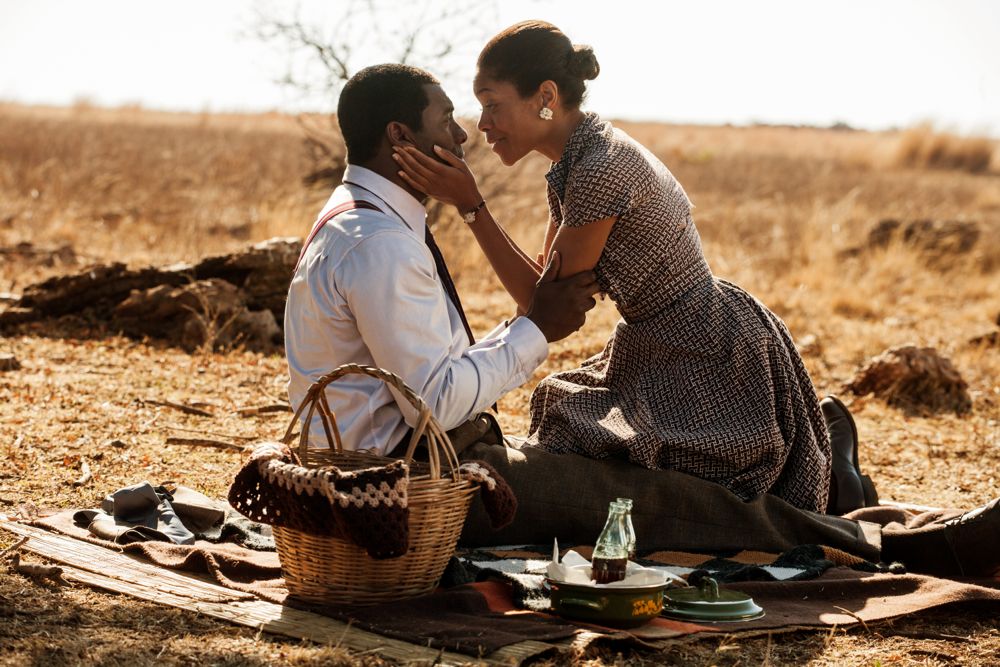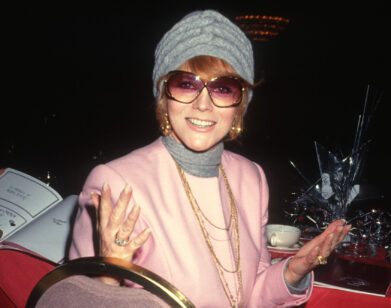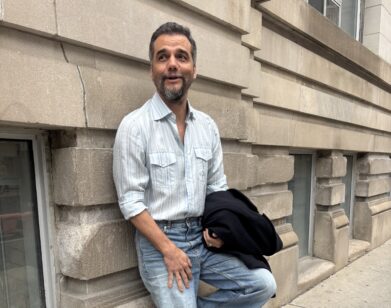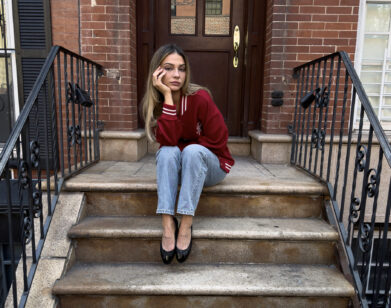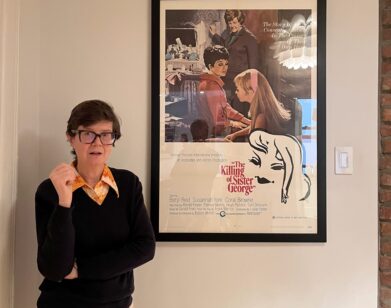Justin Chadwick and the Madiba Effect
Anyone who agrees to direct a biopic of Nelson Mandela has gumption. Especially when it’s a biopic based on Mandela’s best-selling autobiography, Long Walk to Freedom (1995), with his children, ex-wife, friends, and country standing watch. Once the British director found his entry point into the spirit of the former South African President’s life, however, his fears dissipated. Directing, Chadwick tells us when we meet him in New York, is “about catching that elusive moment of truth. The camera and technical side of it is relatively simple.”
Out in wide-release this week, Chadwick’s Mandela: Long Walk to Freedom focuses on Mandela and his second wife, the controversial Winnie Madikizela Mandela. The film stars British actors Idris Elba and Naomie Harris—the latter of whom Chadwick worked with on his previous film The First Grader (2010)—as Nelson and Winnie. Ambitious in scope, Chadwick charts Mandela’s life from his childhood in the Cape Province of South Africa, to 1995, when he accepted the South African presidency after 27 years of imprisonment. Although it is a particularly competitive year, both Elba and Harris are strong contenders in the Oscar race, with Elba’s odds raised slightly by his recent Golden Globe nomination.
EMMA BROWN: How aware were you of Apartheid when it was happening?
CHADWICK: I remember being at college when Mandela was released and waiting for him to come out and not knowing why it was taking so long or what he looked like. Then, three years ago, I stood in Victor Verster [prison] with a guard that was there on the day, and I said to him, “Why were we all waiting so long?” And this chap said, “Well, he wouldn’t walk out without Winnie.” He wanted to walk out hand-in-hand with Winnie. Even though their relationship was really fractured and broken at that time, he wanted to walk out with her. It meant a lot. That’s when the story really clicked for me. They’d been trying to make the film for quite a few years, and I’d been in South Africa for a year researching it and interviewing people. When this guard said that, I thought, “That’s the way into the story—the love story, the personal story.”
I had a chance to get an intimate understanding of him. We all know Mandela was this great political leader and a brilliant lawyer when he was a young man, but I actually talked to people who had partied with Mandela as a young guy and knew he loved women, knew he loved cars and tailoring and clothes. When he walked into a room, he was like a star —people talk about the “Madiba” effect, you felt his presence completely. The same with Winnie. That made me more determined to cast Idris, because Idris is a star and has a warmth and a humanity that felt true to the character. At first I was hesitant about taking the project, because I didn’t want it to be a spinach-eating experience—a period movie, biopic…Oh, God. I wanted this to be a film that stood in the cinema, dropping the audience in amongst it: great action sequences, an epic landscape. We were really in Soweto; we were really in those communities. The crowd that you see is not CGI, it’s real people who are living today in South Africa. So you need a very, very subtle actor who’s going to be true to the people and characters that you’re representing.
BROWN: Mandela is such an omnipresent figure in popular culture, it is strange to think there was a time when nobody knew what he looked like because he was in prison and they tried to destroy all the photos of him.
CHADWICK: In some ways that enabled us to fill in the blanks and be a little bit freer. Idris Elba, apart from his height—he’s 6’3″, exactly the same height as Mandela—[does not resemble Mandela]. He’s a Londoner. I didn’t want any of the characters to do a lookalike version; I wanted to capture the spirit of the men and women we were representing rather than do an impression of them. So that lack of photographic evidence gave us a little bit of freedom to make it feel true to the people and not cover them with affectation.
BROWN: Did you become aware of Idris through The Wire?
CHADWICK: Through The Wire.
BROWN: Did you know he was English?
CHADWICK: I didn’t know at first, no. I completely believed him in The Wire—I thought he was American. When we were casting—this was before Luther, really, over three years ago—the producers had been thinking of another kind of star, and I started talking about Idris. I had an instinct about him, that he had a presence about him—and a subtlety, really.
BROWN: Winnie Mandela seems to change the most over the course of the film. Do you think she would have taken a different path if Mandela hadn’t been incarcerated for such a long time?
CHADWICK: That was one of the revelations for me. We have an understanding of Winnie—I have it from growing up in Manchester, the Western press’ version of what Winnie Mandela is. Mandela’s a man with a set of beliefs that get him incarcerated for 27 years—almost put on ice for 27 years—away from the dissent into madness. For Winnie, she still lives in Soweto today. She’s been there; she was there. I heard her talking about being dragged out of their house, and her daughters coming home from school and not knowing where mummy was and she was put in solitary confinement for 17 months. Solitary! Solitary confinement and abused, and not knowing where her children were. I’m sitting in Soweto with her, she’s got a great-great-grandchild on her knee, and the importance of family to her, the importance of her children and daughters and them not knowing—I think things would have been very different. When Mandela goes into prison, he doesn’t change; the world comes to Mandela. That makes his journey all the more extraordinary: that he is able to find forgiveness and is able to find a way through [when] the country was at a tipping point. I don’t think there’s another example in world history where a man and a country have been able to make that transition for peace, I really don’t. How he did it is extraordinary.
BROWN: This is your third feature film, and I know that you worked as a director in television before this. What was your first paid job?
CHADWICK: I managed to get a short film with Channel 4 Films. I cast a young actor who’d done a bit of television before, a young actor called Ewan McGregor. That was very first thing. This writer had won this competition, and I made this little short, black and white movie. I think for both Ewan and I it was the start of our careers. He was just out of drama school, and I was just out of doing my drama degree.
BROWN: Do you keep in touch with him?
CHADWICK: Yeah. I did another short film and he came back and did that, so I did two short films with him. I used to hang out with him in London, but he moved to America. I saw him at the Toronto Film Festival—me and my wife—and it was great to see him again, he’s done so brilliantly. I’m so pleased for him and proud of him.
BROWN: You acted a bit as well, right? When did you switch from acting to directing?
CHADWICK: Well, I did the acting because it funded my shorts and I wanted to have the experience. I was directing at college—a theater director. As soon as I got my proper first job, I never did acting again. I think the last thing I did was a Mike Figures film, and then I got a series with the BBC. I’m glad of the experience, because I think it’s very, very good to understand what actors go through. But I wanted to be a director, and I was so glad when I was able to get my first proper job. I’d made that short before but that was an unusual thing—to be paid for a short film.
BROWN: Were you encouraged creatively as a child? Directing is quite a hard field to get into.
CHADWICK: Yeah, nobody in my family was from that [world]. My dad has the same job in Manchester—works in the same basement in Manchester that he’s worked in all his life. I was very fortunate that a teacher saw that I read a lot and got bored very easily and had a lot of energy, so she said you’ve got to go to this youth theater. I joined Manchester Youth Theatre when I was really young and I just loved putting on and being involved in plays and telling stories. It was somewhere I could channel my energy. I wouldn’t have known at that age, what a producer is. I still think my mum and dad don’t really know what a director or a producer does,. [laughs] But that was the start for me: youth theater.
BROWN: What was your first lead role, in youth theater?
CHADWICK: My first lead role was a stage play called A Kestrel for a Knave. I was 11. It was about a guy from a council estate, that finds a bird, and this bird represents freedom, basically. A beautiful Barry Hines book, which was then made into a movie by Ken Loach called Kes. It’s one of his first films. For the first scene, I had to be in my underpants, which was excruciating for an 11-year-old in front of all your other mates. Shortly afterwards I said, “fuck”—I was able to swear in this play. It was great! A very well written play and a great social commentary on what was happening in the North at that particular time. I’ve still got that poster. It’s one of the few posters I keep up in my study to remind me. I think the director was a fireman. From that moment I was like, “Yeah, there can be something different that I could do here… maybe.” I never thought I could make a job of it.
MANDELA: LONG WALK TO FREEDOM IS OUT NOW.

